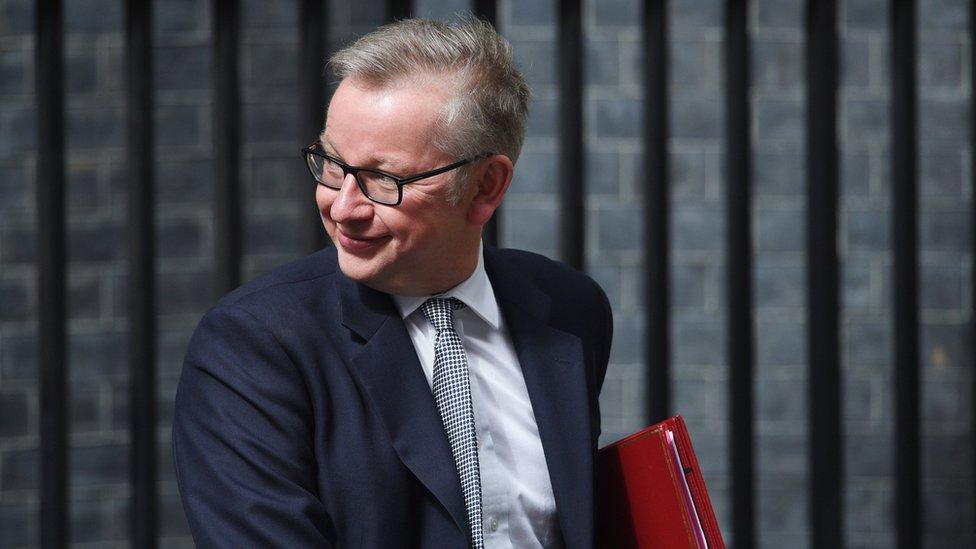Michael Gove: Brexit 'consensus' needed after general election
- Published
- comments

The government needs to seek the "maximum possible consensus" on Brexit in the light of the general election result, Michael Gove says.
The new environment secretary, a leading figure in the campaign to leave the EU, said the referendum result should be "honoured in the right way".
The Tories no longer have a Commons majority with EU negotiations set to begin next week.
There have been calls for a cross-party commission to seek agreement.
In the Daily Telegraph, external, Former Conservative leader William Hague said a "change of style and substance" was now needed, suggesting a commission, also including business leaders and trade unions, to find areas of agreement.
Scottish First Minister Nicola Sturgeon has also called for a cross-party approach, and Labour's Yvette Cooper said a commission was needed to avoid Brexit being "caught up in the inevitable Hung Parliament political rows".
Theresa May set out the government's strategy last year and started the clock on the UK's final departure from the EU in March.
Downing Street has said there will be no changes to this approach, despite the Tories looking like they will have to rely on the Democratic Unionist Party - which backs Brexit but has specific demands including close trade with the EU - to stay in power.
Mr Gove noted that most votes at the election had been cast for either the Conservatives or Labour, who both support leaving the EU and ending freedom of movement, but added: "It is important to recognise we were not returned with a majority."
The government should "proceed with the maximum possible consensus", he told BBC Radio 4's Today programme, and "make sure that Remainers' concerns are part of our conversation".
Following reports of talks between some Remain-backing Conservative and Labour MPs, he rejected a "softening" of the government's approach, but said there were a "significant number of questions as we leave about the shape that we want our country to take".
But he played down Lord Hague's suggestion of a commission - "this idea is very much his copyright", he added.
Michael Gove denies he accused PM of failing to "drain the swamp" of Islamist extremism
Another ex-Tory leader, Iain Duncan Smith, dismissed suggestions of a change in the Conservatives' approach as "made-up nonsense".
He told the BBC the DUP had supported the government's strategy before the general election and "the vast majority of the Conservative Party believes this is a settled issue".
Aside from Brexit, it has also been reported that the DUP's opposition to some austerity measures could trigger a rethink in the government's economic strategy.
Asked about this, Mr Gove said ministers had to "reflect on what the election result told us about the way that people want to see the economy managed in the future".
He said there was a need to ensure public spending was kept at a sustainable level but stressed that "we also need to take account of legitimate public concerns about ensuring that we properly fund public services in the future".
The former education secretary, who clashed with Mrs May when both were ministers and was then sacked by her when she arrived in Downing Street, declared himself a "huge fan" of the PM.
He also rejected criticism of his environmental credentials by some campaigners, saying he had spoken in 2006 in favour of a bill making it easier to fight climate change and attributing his later voting record to having been following the whip in government.
"My own approach has always been to argue for strong action to deal with man-made climate change," he added.